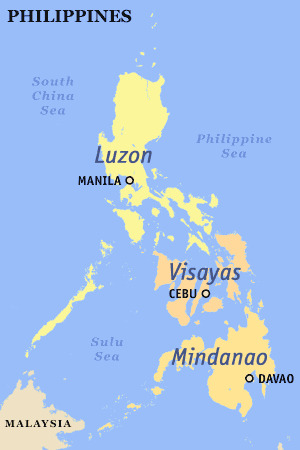
The Visayas, or the Visayan Islands, are one of the three principal geographical divisions of the Philippines, along with Luzon and Mindanao. Located in the central part of the archipelago, it consists of several islands, primarily surrounding the Visayan Sea, although the Visayas are also considered the northeast extremity of the entire Sulu Sea. Its inhabitants are predominantly the Visayan peoples.

In the Philippines, regions are administrative divisions that primarily serve to coordinate planning and organize national government services across multiple local government units (LGUs). Most national government offices provide services through their regional branches instead of having direct provincial or city offices. Regional offices are usually but not necessarily located in the city designated as the regional center.
The Central Philippine languages are the most geographically widespread demonstrated group of languages in the Philippines, being spoken in southern Luzon, Visayas, Mindanao, and Sulu. They are also the most populous, including Tagalog, Bikol, and the major Visayan languages Cebuano, Hiligaynon, Waray, Kinaray-a, and Tausug, with some forty languages all together.

The American College of Physicians (ACP) is a Philadelphia-based national organization of internists, who specialize in the diagnosis, treatment, and care of adults. With 161,000 members, ACP is the largest medical-specialty organization and second-largest physician group in the United States, after the American Medical Association. Its flagship journal, the Annals of Internal Medicine, is considered one of the five top medical journals in the United States and Britain.
The Philippine Science High School System is a research-oriented and specialized public high school system in the Philippines that operates as an attached agency of the Philippine Department of Science and Technology.

The Student Catholic Action is a religious student organization in the Philippines. Its affiliation overseas is the International Young Catholic Students (IYCS), also known as International Young Christian Students in Asia, that follows the methodology of Cardinal Joseph Cardijn, the see-judge-act methodology. Known to be the first student religious organization in the Philippines and presently known all over the Philippines through local dioceses and catholic schools.

Cebu Institute of Medicine (CIM) is a private medical school located in Cebu City, Philippines. The medical school is affiliated with the Velez College.

The Philippines is divided into three major island groups: Luzon, the Visayas, and Mindanao. Luzon and Mindanao are both named after the largest island in their respective groups, while the Visayas is an archipelago.

The Philippine Normal University is a public coeducational teacher education and research university in the Philippines. It was established in 1901 through Act No. 74 of the Philippine Commission "for the education of natives of the Islands in the science of teaching". It has campuses in Manila, North Luzon, South Luzon, Visayas, and Mindanao. Pursuant to Republic Act No. 9647, it is the country's National Center for Teacher Education.
Medical education in Philippines is principally offered and developed by accredited and government recognized medical schools in the country.

The Christian And Missionary Alliance Churches of the Philippines (CAMACOP) is a Christian evangelical group in the Philippines that originated from The Christian and Missionary Alliance (C&MA). It is one of the largest evangelical groups in the Philippines.

The Naval Reserve Command (NRC), also known as NAVRESCOM or RESCOM, (Filipino: Pangasiwaan ng Panlaang Kawal ng Hukbong Pandagat) is one of the Philippine Navy's Major Support Commands created for the sole purpose of reserve force management, procurement, and organization.
Hope Channel Philippines is a religious network of the Seventh-day Adventist Church in the Philippines. Its TV stations are owned by Gateway UHF Television Broadcasting, while its radio stations are owned by Digital Broadcasting Corporation. Founded and launched on September 26, 2010, in the South Philippines and in January 2011 in Luzon and Visayas. It was first seen on UHF Channel 25 in Cagayan de Oro in the Northern Mindanao region.

Ofelia Manibog Samar-Sy is a Filipino physician in Internal medicine and Cardiology, medical educator, Medical Director of Ibalong Medical Center in Legazpi City, Albay, in May 2014 she was appointed Dean, College of Medicine of Bicol Christian College. She is currently the Dean of Bicol University College of Medicine.
The 2013 Philippine Collegiate Championship was the sixth edition of the Philippine Collegiate Champions League (PCCL), the postseason tournament to determine the national collegiate champions in basketball organized by the Samahang Basketbol ng Pilipinas (SBP), the national basketball federation. The tournament was the sixth edition of the tournament in its current incarnation, and the eleventh edition overall.
The 2018 PCCL National Collegiate Championship is the tenth edition of the Philippine Collegiate Champions League (PCCL) in its current incarnation, the postseason tournament to determine the national collegiate champions in basketball. The tournament will be the 15th edition overall.

The 2019 Philippines measles outbreak began in early 2019. An outbreak of measles was officially declared in February 2019 in select administrative regions in Luzon and Visayas including Metro Manila by the Philippine government. The outbreak is attributed to lower vaccination rates, from a high of 88% 10 to 15 years previous to 74% at the time of the outbreak, allegedly caused by the Dengvaxia controversy.










